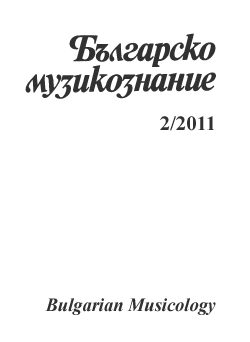Симеон Пиронков-син и концепцията за музикалния фротаж
Simeon Pironkoff, Jr. and the Concept of Music Frottage
Author(s): Angelina PetrovaSubject(s): Music
Published by: Институт за изследване на изкуствата, Българска академия на науките
Summary/Abstract: The object of this text is the music of composer Simeon Pironkoff , Jr., who was born in 1966 in Sofia, Bulgaria, graduated in composition and sett led in Austria. The concept of frottage technique is introduced in the poetic world of Simeon Pironkoff , Jr., in conformity with Max Ernst’s term, in an interpretation as a music-structural method. The frottage idea is a kind of marker for his individual creative path or choice after his emigration. In the motivation to experiment with the frottage technique Simeon Pironkoff , Jr. creates his own ideas for a radical-language approach. In his comments on Attack he speaks of polyphony which is characterized by fragmentary character. The frottage composition-technique is associated with a specific dramaturgy in which the notion of “free field of meaning” is incorporated. There are several successive stages in Simeon Pironkoff , Jr.’s career as a composer. In the 1990s (1990– 2000) he created a series of works for large orchestra – Versionen für Orchester (1988, Wien), Musik für Streicher (1987) and others, in which the frottage idea crystallized gradually. Special place in his composing evolution is taken by his work Attaca, also named 31 Messages for Ensemble, written in 1998, which was premiered in the same year by Ensemble recherche. The composition Outline is also featured among the large scale ensemble opuses related to the compositional ideas and the theory of ‘musical frottage technique’ from this period. The two pieces mark the climax in the development of the concept of frottage. Along with these orchestral and ensemble works created the text “Figure and drama”. There followed another stage in the composer’s evolution. In the 2003–2010 period he created several chamber instrumental opuses, in which he opposes/counterponts a contemporary instrumental ensemble and traditional Eastern instruments, e.g. Départs imprevues (Music for Zheng, Oboe, Accordion and Percussion) (2004); Fall / Wende for Zheng and Accordion (2005), etc. In them the author is looking for unexplored fields and challenges rather than language-cultural counterpoints and comparisons.
Journal: Българско музикознание
- Issue Year: 2011
- Issue No: 2
- Page Range: 10-27
- Page Count: 18
- Language: Bulgarian
- Content File-PDF

